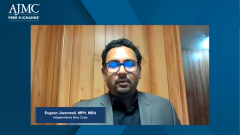
Future Outlook: Comprehensive Genomic Profiling in Oncology
Expectations regarding the future utilization of comprehensive genomic profiling in clinical practice to assess patients with solid tumor cancers.
Episodes in this series

Bruce Feinberg, DO: We're going to shift gears and talk about the future of genomic profiling. And get back to my original question: Are we at an inflection point? Is complete genomic profiling, has it moved from the last thing you do when you've exhausted standard of care to the first thing you do before you initiate systemic therapy? And that would be in the metastatic setting or at all.
Mark, it sounds like certainly in terms of thoracic medical oncology, if it's reflex testing at a pathologic level, it has moved into being the first thing you do that guides all future decision-making. Mark, to what extent have you seen that across the other solid tumor areas? I've done some recent program moderation with community oncologists, and I'm hearing now it's fairly routine and without much payer pushback in colorectal, newly metastatic, in melanoma, and I'm just wondering, how far has it gone? And is it already here? Have we already had this shift?
Mark G. Kris, MD: I think I've seen the same trends. But as of December 15, 2021, we're the only disease at MSK [Memorial Sloan Kettering] where the medical board has sanctioned reflex testing.
What of reflex testing, by the way. This is already a standard of care in every pathology department for immunohistochemistry, so to improve their diagnostic capabilities, I'll pick on lung again. You look at TTF-1, you look at Napsin A, you look at P40. These tests are all done by the pathologist and all billed and paid for. This concept of something that's needed is already a standard of care and has been for decades, frankly, in the pathology world. And this is an extension of that. But the other diseases, they're making a case that they need this as well. But it hasn't happened, at least at our institution.
Bruce Feinberg, DO: Kenna, you gave me a more nuanced response about how it's being done.
Kenna R. Mills Shaw, PhD: We don't do reflex testing quite as much but there are definitely tumor types where it is part of basically - new patients come in and this is what you're going to get as part of your care by one of our oncologists. While breast cancer in general is, upon diagnosis, you're going to get your ER [estrogen receptor], PR [progesterone receptor], HER2 and maybe not an NGS [next-generation sequencing] or comprehensive genomic profile [CGP] from day one. If you're a patient with thyroid cancer, melanoma, colorectal cancer, often sarcomas because many types of rare tumors also don't have another standard of care, even from a chemotherapeutic perspective. But they do have pretty robust fusion panel approaches, for example. If we know that there's a high likelihood of a driver alteration that we can act on, then that's the type of tumor that's going to be acted upon from an oncologist perspective, with the CGP assay, in addition to the rest of the workup they would have.
Bruce Feinberg, DO: With this, I don't know, it's like a daily research report of another 1% of the patient population that's expressing RET, MET, NTRAK, MSI [microsatellite instability], you pick it. It seems like from a future thought, are we one more tumor agnostic away from everybody gets it? Or do you think we're still dealing with such small percentages?
Kenna R. Mills Shaw, PhD: I do still think we're quite far from that, considering just this aspect of there are at least 2 that I know of, TMB [tumor mutational burden] and MSI, just as 2 examples of tumor agnostic biomarkers. And we just heard that even in lung cancer, where there are a lot of TMB-high patients, as we know, we're not doing that routinely. And that's also true, I would say TMB is not a universally accepted smoking gun. And MSI is a tumor-agnostic approval. If you're high for microsatellite instability, and we do not test every patient that walks in our doors for MSI. It is just not something that is done despite approval.
Bruce Feinberg, DO: But there are 13 malignancies that have been, I guess, clearly identified. I'm assuming you're testing all 13?
Kenna R. Mills Shaw, PhD: I'll remain silent.
Bruce Feinberg, DO: Eugean's excited.
Eugean Jiwanmall, MPH, MBA: Kenna, I would like for you to finish your point because I think I have a couple of things that I can add on to it.
Transcript edited for clarity.
Newsletter
Stay ahead of policy, cost, and value—subscribe to AJMC for expert insights at the intersection of clinical care and health economics.









